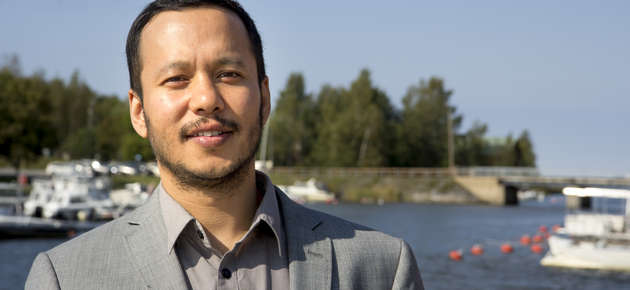Dissertation: Some tourists simply seek home away from home while on holiday


A new doctoral dissertation by Erose Sthapit from the University of Vaasa examines this spillover from home to away and vice versa among family vacationers and creates a broader understanding of the sources of spillover. Sthapit’s doctoral dissertation includes four scientific articles. All the studies were conducted among international tourists visiting Rovaniemi, Lapland. The topic is timely as tourism is booming globally and the number of visitors to Finnish tourism destinations, Lapland, in particular, is growing and offering significant economic benefits for the region, but also Finland at large.
"I acknowledge that holiday for some tourists is a pursuit for experiences that are different to their everyday lives, for example, tasting local foods or buying unique souvenirs while at a destination. However, for others the difference between home and while at a tourist destination is blur and they may behave in a similar ways as home", says Sthapit.
The results from his dissertation show family vacationers tend to do the same kinds of activities at home and while at a tourism destination. If they like to visit museums, ski, hike, shop or swim at home, they are keen to do it during their holiday as well. The results also indicate that the meaning of home extends beyond a fixed location. It can be mobilized through leisure involvement and habits while at a tourist destination when participating in activities.
"In fact, those who are highly involved and have a favourite leisure activity are more likely to participate in the same activity at a destination because it involves minimal planning and offers convenience, stability, comfort, and relaxation in a new environment. It is important to understand that not all tourists are seeking newness, and some might exhibit usual behaviours in both their home and holiday environments. Today, the holiday environment is no more a zone of novelty, but both home and away co-exist in leisure travel", says Sthapit.
According to Sthapit, tourism service providers should be more aware of the activities that visitors undertake at home when developing and offering activities targeted towards family vacationers. Different activities targeting different visitor groups are important to creating satisfactory experiences and repeat visitation.
Souvenirs evoke the desire to make another trip to a same destination
Sthapit’s research also shows that purchase of unique, usable, and functional souvenirs prolonged respondents’ Rovaniemi trip experiences, and these memories aroused their desire to return to the destination. This is highlighted by the responses of three respondents.
One said, “I think the thing that makes a souvenir memorable is its uniqueness. It is something that I can’t find in my own country. I like to look at it and try to remember what we did in Rovaniemi and I will go there still several times” (Aurore, French).
Others said, “Uniqueness and use of local product. I bought 30-60 items. I prefer traditional Christmas of Finland over others. Reminds me of Rovaniemi and Santa village. It was the most magical holiday. Yes, yes, yes, my family really wants to visit again” (Kerry, Australian);
and “I did take a lot of berry jam home with me and chocolates from Karl Fazer and honey . . . everyone including me loved it at home . . . Food keeps my memory fresh and makes me dream of those days and wanting to go back as soon as possible” (Al-Batool, Kuwaiti).
The spillover is by no means just a one way street – it also happens from away to home
"Tourism, by its nature, means the temporary movement of people, and the trip must come to end. However, for some tourists there is continued engagement. For example, some people take back souvenirs that then become part of their everyday experiences. The use of souvenirs remind them of their trip and evoke their desire to visit the same destination again", says Sthapit.
Also, the memories of local food experiences including experiencing excitement and something meaningful while at a tourist destination emerge in the moments of storytelling and have an impact on people’s happiness and life-satisfaction.
"These memories of the trip experience and souvenirs represent the existence of the extraordinary in the ordinary home environment. Therefore, rather than a complete departure, there is some degree of attachment with the tourist destination even after returning home from the trip", Sthapit describes.
Further Information
Erose Sthapit, tel +358 44 0777104, erose.sthapit(at)uwasa.fi
Sthapit Erose (2018). Examining the Antecedents of Spillover within the Context of Tourism: Activities, Memorable Tourism Experiences, Culinary-Gastronomic Experiences and Souvenir Perspective. Acta Wasaensia 408. Doctoral thesis. University of Vaasa. Vaasan yliopisto.
Publication pdf and publication orders: http://urn.fi/URN:ISBN:978-952-476-825-2
Erose Sthapit was born in 1984 in Kathmandu, Nepal. He has a Bachelor’s degree in Business Studies (2005) and Hospitality Management (2010). He completed his Master’s degree in Social Sciences (Tourism Research) from the University of Lapland, Finland (2013). He has published extensively during his doctoral studies in different tourism journals including Anatolia, Current Issues in Tourism, Psychology & Marketing, Scandinavian Journal of Hospitality and Tourism, Tourism Management Perspectives and Leisure Studies.
Public defence
The public examination of M. Soc. Sc. Erose Sthapit’s doctoral dissertation “Examining the Antecedents of Spillover within the Context of Tourism: Activities, Memorable Tourism Experiences, Culinary-Gastronomic Experiences and Souvenir Perspective” will be held on Wednesday 12 September at noon in auditorium Nissi (K218, Tritonia), University of Vaasa. The field of dissertation is marketing.
Professor Nina K. Prebensen (The Arctic University of Norway, Norway) will act as opponent and professor Pirjo Laaksonen (University of Vaasa) as custos. The examination will be held in English.
